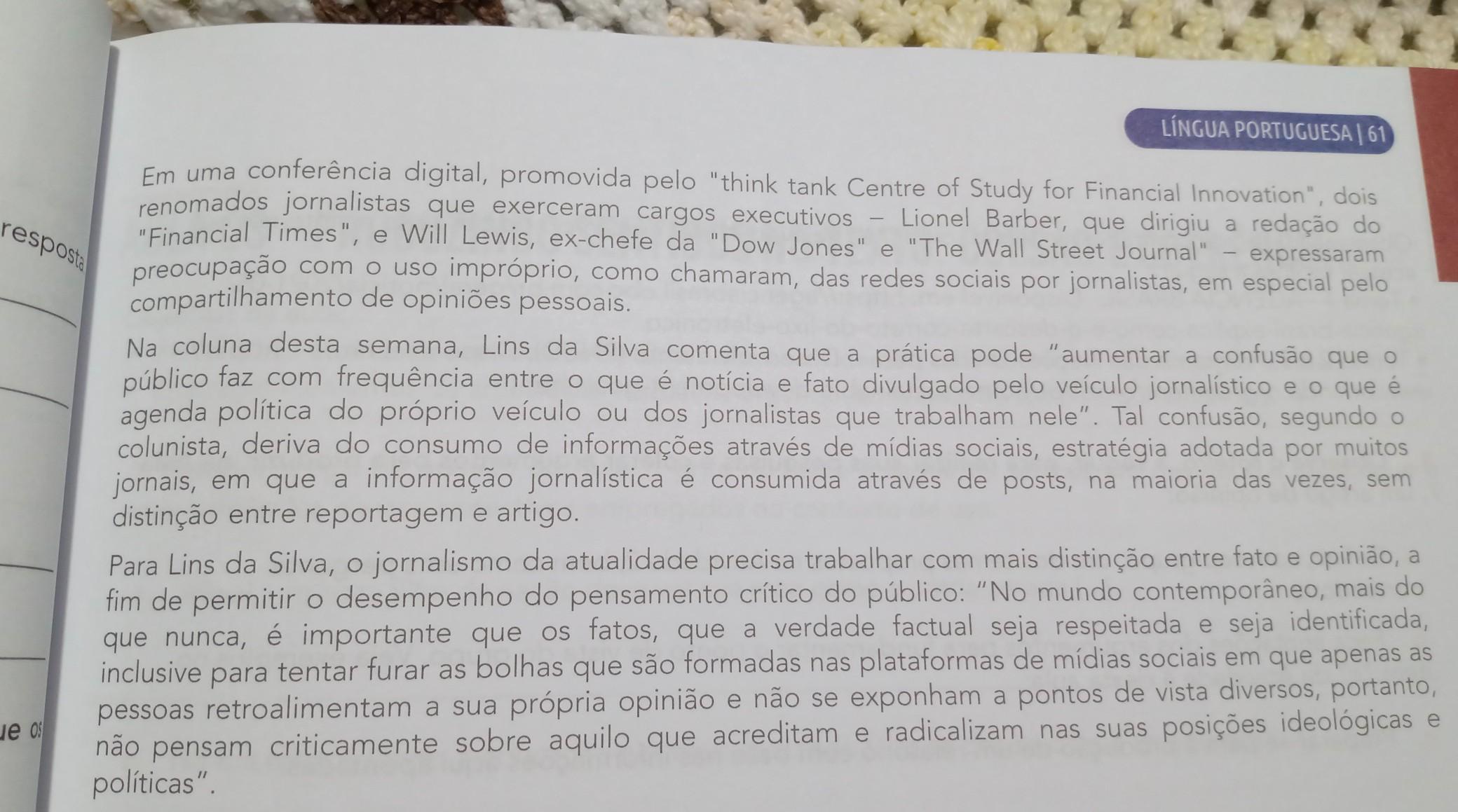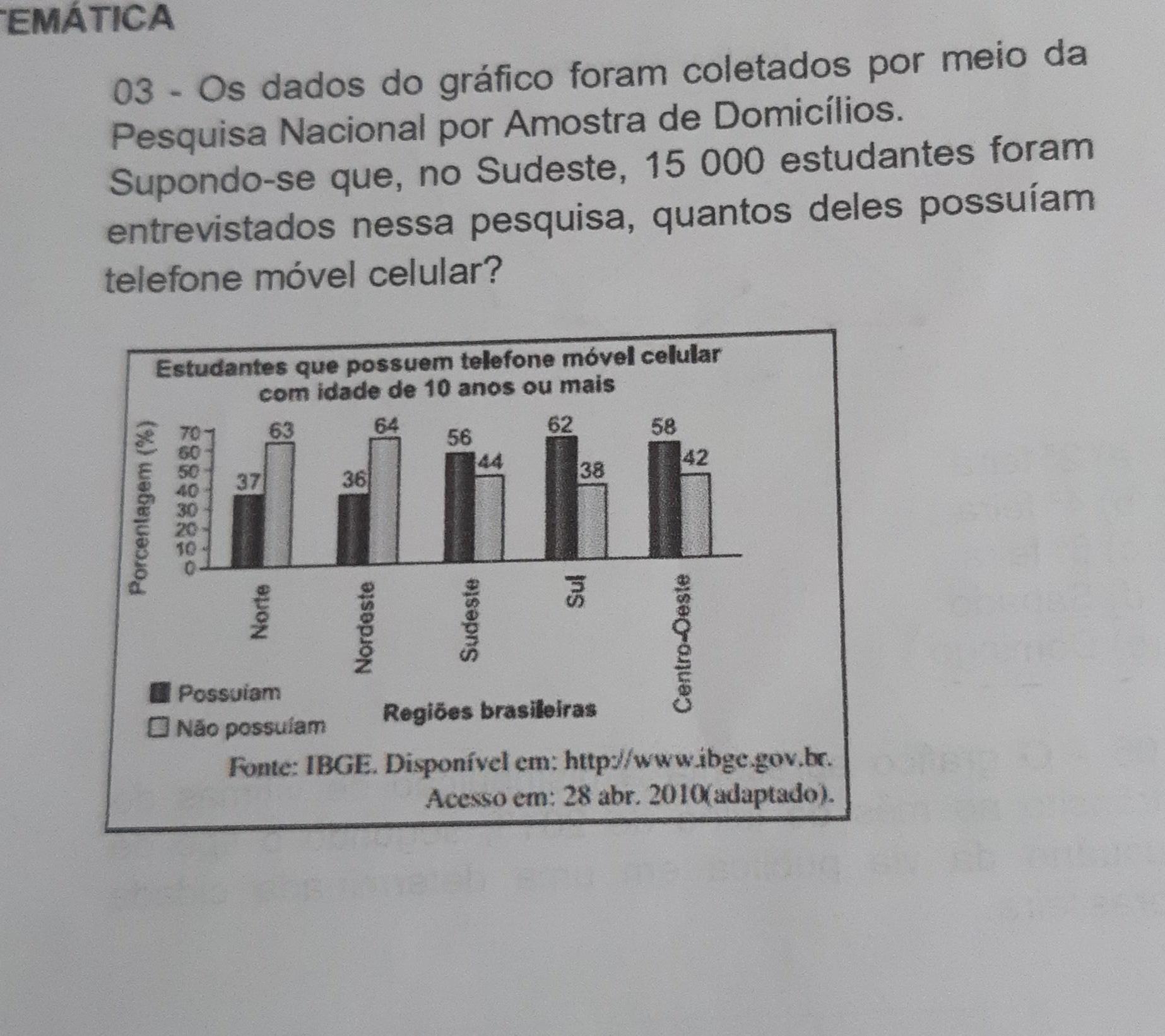a. Os textos que expressam um ponto de vista apresentam, além do tema, uma tese a ser defendida. Em relação ao artigo de divulgação científica desta aula, qual é o tema? b. É possível afirmar que o autor do texto defende um ponto de vista? Apresente-o. c. No primeiro parágrafo do artigo de divulgação científica, por que o professor Lins da Silva cita uma conferência digital e dois "renomados jornalistas" de grandes jornais internacionais? Que recurso argumentativo ele usou? 2. A seguir, há sugestões de três temas para suas pesquisas: a. Tema 1: O lixo eletrônico e o descarte correto; b. Tema 2: Energia acessível e limpa; c. Tema 3: Redução das desigualdades. dog
Os dados do gráfico foram coletados por meio da Pesquisa Nacional por Amostra de Domicilios. Supondo-se que, no Sudeste, 15 000 estudantes foram entrevistados nessa pesquisa, quantos deles possuíam telefone móvel celular?
Referente à gestão patrimonial de empresas, é correto afirmar que:
o valor contábil de um bem depende de como esse bem é utilizado e mantido, uma vez que é a diferença entre o valor depreciado e o valor de mercado.
patentes e direitos autorais não são incluídos no nos controles patrimoniais por serem bens intangíveis.
o gerenciamento da depreciação é de importância secundária, uma vez que esta não impacta no resultado operacional da empresa.
a decisão de substituir equipamentos deve ser tomada com base nas estimativas de custo anual equivalente do equipamento defendente e do equipamento desafiante.
a vida econômica de um bem é o tempo que ele demora para perder todo o seu valor contábil.
A Classroom Path to Entrepreneurship
By GLENN RIFKIN Published: May 1, 2008
The college campus, it turns out, can be an ideal incubator for hatching small businesses. Nanina’s Gourmet Sauce, a pasta sauce company based in Belleville, N.J., was started, for instance, in 2005 by students taking an entrepreneurship course at Monmouth University in West Long Branch, N.J. Nanina’s products are now sold in nearly 400 supermarkets and gourmet shops in New Jersey and Manhattan, and the company’s director of operations is 23-year-old Nick Massari, a student in that class. The course at Monmouth is one of thousands of similar offerings on campuses across the United States. Undergraduate courses in how to start and run a small business are becoming as ubiquitous as Economics 101. Gone is the conventional wisdom that running a small business cannot be learned by sitting in a classroom. According to the Kauffman Foundation in Kansas City, Mo., more than 2,000 colleges and universities now offer at least a class and often an entire course of study in entrepreneurship. That is up from 253 institutions
offering such courses in 1985. More than 200,000 students are enrolled in such courses, compared with 16,000 in 1985. The Monmouth course, started in 2005 and taught by John Buzza, a successful food industry entrepreneur who decided to devote his energy to teaching, went well beyond textbooks and lectures. That first year, Professor Buzza brought along with him a real-world challenge. A chef he had worked with at Nanina’s in the Park, an Italian restaurant and catering company in Belleville, had created a tomato pasta sauce that customers were always asking for, but he had neither the time nor the skills to turn the idea into a business. Instead, Professor Buzza gave his class the assignment of starting a pasta sauce company. “We had no idea how to begin,” Mr. Massari said. “But instead of getting lectured on how to do it, we went out and did it.” The class of 35 students was split into five operational teams: sales and marketing, finance, information technology, research and development, and production. They spent significant time researching the market, creating a business plan, revising the plans and carrying out a blueprint for getting the pasta sauce on supermarket shelves. The next semester, they took a course in small-business management where they learned to run the nascent company as a business. The company began shipping its sauce in January 2006, and Mr. Massari, a stellar college infielder who had signed a baseball contract with an independent ball club when he graduated, was asked by the owner of Nanina’s to take over the embryonic business. Giving up his long-shot baseball dreams, Mr. Massari jumped at the opportunity. “I had always thought about owning my own business,” he said...
---
Who started Nanina's Gourmet Sauce?
(1) Professor Buzza.
(2) Mr. Massari.
(3) Kaufmann Foundation in Kansas City.
(4) the students in Professor Buzza's class.
(5) a group of students who used to eat at Italian restaurants.
---
In American Universities, entrepreneurship courses are
(1) less important than Economics 101.
(2) taught according to a theoretical perspective.
(3) as popular as a basic Economics course.
(4) only thought in New Jersey and Manhattan.
(5) less popular then Finance and Operations.
---
Professor Buzza is
(1) a scholar in the field of Business Administration.
(2) the only owner of Nanina's Gourmet Sauce.
(3) a successful former entrepreneur.
(4) the owner of a Italian restaurant.
(5) the Dean of Monmouth University.
---



